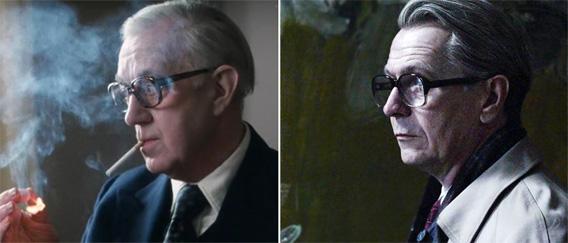About half of Agatha Christie’s 66 mystery novels received a film treatment, whereas only eight of John le Carré’s 23 novels have made it to the big screen. (As it happens, 23 is also the number of extant James Bond movies.) This modest smattering of le Carré adaptations makes a certain sense. Christie was an enormous commercial success as a playwright, and her novels move with the rhythms of film, and the screenwriter’s work is therefore quite simple. Le Carré’s plots, meanwhile, stymie certain easy conventions of the cinema of espionage; his novels may not be as “unfilmable” as Tristram Shandy, but the challenges remain steep. Most of the novels end, in Samuel Johnson’s phrase, with “a conclusion in which nothing is concluded,” or else in something approaching tragedy. This is hardly popcorn material. Even that dismal final sequence (in which bent bureaucrats get a measure of comeuppance) in director Fernando Meirelles’ wonderful The Constant Gardener (2005) is a game of cricket compared with the book.
While Martin Ritt’s apparently ageless The Spy Who Came in from the Cold (1965) remains in rotation on TCM, you’ll have to do some sleuthing to get hold of Sidney Lumet’s The Deadly Affair (1966), an adaptation of Call for the Dead (1961), in which James Mason plays the Smiley figure (here named “Charles Dobbs” for copyright reasons). It’s a very good film and well worth the trouble of finding, not least for Quincy Jones’s ominous but slinky soundtrack. The search for Frank Pierson’s The Looking Glass War (1969) will bring you in contact with any number of dubious Web vendors, and the rewards are slimmer than with Lumet. Anthony Hopkins and Ralph Richardson turn in fine performances, but everything else feels thin—perhaps because the novel itself is not the master’s finest.
George Roy Hill’s The Little Drummer Girl (1984), starring Diane Keaton, is half-forgotten and much maligned (Roger Ebert wrote simply that “it’s not comprehensible, and it’s not involving”), probably because it’s a bit too faithful to the book. Certain intricacies will befuddle viewers unfamiliar the source text, but the performances are largely excellent. Any movie in which David Suchet plays a villain bears more than a glance, and Klaus Kinski’s flamboyant take on Israeli superspy Martin Kurtz is a marvelous piece of overacting that balances Keaton’s somewhat quieter approach. The film is also noteworthy for an early appearance by Bill Nighy, whom American audiences are conditioned to think of as a paragon of the wrinkled but dignified English codger. (Drummer Girl is also memorable for its regrettable period hairdos. Keaton pulls off the perm, but only just.)
In this century, le Carré has exercised increasing control over adaptations of the novels, serving as executive producer on John Boorman’s The Tailor of Panama (2001) and Tomas Alfredson’s Tinker, Tailor, Soldier, Spy (2011). The former seemed to fade from memory amid the critical glow that greeted The Constant Gardener—a shame, since Boorman nails nearly everything in adapting le Carré’s most overt satire. Pierce Brosnan is a smart choice, a sexier, more Byronic version of Andy Osnard, the novel’s stout and semidisgraced agent whom the Circus has exiled to one of Britain’s less tony embassies. Brosnan plays to his strengths, wringing every bit of slimy hucksterism out of his character’s rather blunt lexicon. Geoffrey Rush is a marvel as Harry Pendel, channeling a bumbling, working-class vein of comedy derived from the yuk-factory of England’s Ealing Studios in the ’40s and ’50s. As with Constant Gardener, the ending is sanitized but very sly nonetheless. (Look for Harold Pinter’s bit part as the ghost of Harry Pendel’s con-man Uncle Benny.)
The BBC adaptations of Tinker, Tailor, Soldier, Spy (1979) and Smiley’s People (1982) are famously excellent, and their excellence has been amply discussed elsewhere. One of the biggest fans of these miniseries was John le Carré himself, so enamored with Alec Guinness’ portrayal of Smiley that he dedicated The Little Drummer Girl to the actor. These two miniseries adapt the first and third installments of the “Karla trilogy” respectively. (The trilogy appeared as an omnibus tome, The Quest for Karla, in 1982.) The BBC decided to ignore the trilogy’s middle child, The Honourable Schoolboy, explaining at the time that Hong Kong production costs were too high. Grim little back-alleys and safehouses? You can pretty much film those for free.
In fact, no one has yet attempted to film The Honourable Schoolboy, either for television or for Hollywood, and the prospects seem dismal. Compressing Tinker, Tailor into two hours, Tomas Alfredson chose to combine the roles of Jerry Westerby and Sam Collins; since Westerby is the hero of Schoolboy, and since Collins likewise plays a major role, this conflation suggests that Alfredson has no ambitions to adapt the full Karla trilogy. Lovers of the novel are still permitted to dream.
Ranking:
1. Tinker, Tailor, Soldier, Spy (1979)
2. The Spy Who Came in from the Cold (1965)
3. Tinker, Tailor, Soldier, Spy (2011)
4. The Constant Gardener (2005)
5. Deadly Affair (1966)
6. The Tailor of Panama (2001)
7. The Russia House (1990)
8. Smiley’s People (1982)
9. The Little Drummer Girl (1984)
10. A Perfect Spy (1987)
11. A Murder of Quality (1991)
12. The Looking Glass War (1969)
Also read Ted Scheinman’s essay on what he gleaned from reading the complete works of John le Carré, and check out Scheinman’s ranking of all 23 novels.
Update, May 8, 2013: Due to an editorial oversight, these rankings initially left out three le Carré adaptations.
